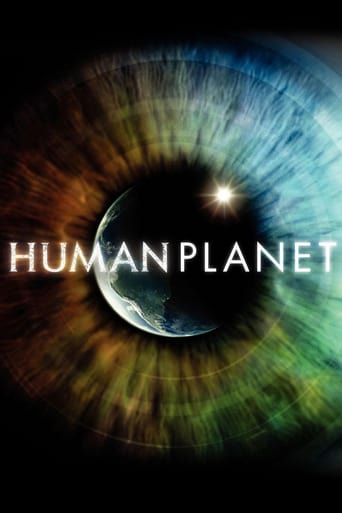pineviewfarms
Amazing! Intriguing! Spectacular! These are a few words to describe BBC's eight-part documentary that looks at the most adaptable, intelligence form of life: the human. A form of life that is everywhere around us, but they present it in ways we never would have thought of. The most intelligent form of life and they explain some of the reasons why. The only form of life to conquer every environment on earth and they explain why. BBC Human Planet looks at the main ecospheres of the environment on earth; Oceans, Deserts, Artics, Jungles, Mountains, Grasslands, Rivers, and Cities. BBC did an excellent job of taking the basic aspects of every culture of the world, such as water, food, and shelter. They took these basic aspects of culture and life and looked at how people meet these needs in the various ecospheres of the world. They take each of these aspects and take a very in depth look at them as an aspect of culture. They include a wide variety of ethnic groups and how their cultures meet these basic requirements. These cultures range from very primitive to extremely developed. Different ways of providing food you will learn about from the Dorobo of South Kenya and their way of stealing lion's kills; the Kazakh of Mongolia hunting with eagles; the people of Northern Greenland's way of hunting auks; and the people of New York City, US planting gardens on top of high rise towers. The different ways people interact with water you will see from the goose barnacle collectors of Spain; the whale hunters on Lembata, Indonesia; and the fish divers of Philippines. BBC in each ecosphere also includes an element of how they live in shelters and homes. They also explore various cultures in their rituals, festivals, and ceremonies. They do a great job of weaving in how the culture is affected by the environment. They show how the environment of certain areas of the world is changing thus affecting the culture. BBC also looks at how western influence and modernization is greatly influencing cultures in the world. BBC did an excellent job in Human Planet of exploring the world and giving an in-depth view at cultures and how they are affected by the environment. It also looked at how these cultures are rapidly being influenced by outside factors. It is an excellent series to watch and get an in depth look at various cultures of the world.
Roald Tempel
I was looking to find some other documentaries about human life because I remembered seeing this documentary and wanted something just like it.The only reason why I was looking for this type of documentary is because this one was so amazing. I feel like 2 years after I watched this documentary it still my favorite. It's about the humans we normally never see. As a traveler it is very interesting apart from the fact that graphics are just stunning. This documentary also gives me the feeling that I want to get out there and look for these kind of groups myself. I would recommend this documentary to everyone (have been doing so the last two years).
saikatbarman2007
this is worth watching, its like, learning the ART of SURVIVAL, we humans are so much adaptive to any situation & environment i didn't know till i watched this series, awesome captures & shots, i salute the crew to take such risks of their lives to bring us these huge ocean of knowledge! the most amazing thing was, the isolated tribes, living in the deep forests, about whom we had very less knowledge, & i wonder how the crew members managed to shoot there & how they communicated with them, difficult task; & i really appreciate their shooting of a tribe which was unknown to the human society till date, they did the shot from an aeroplane, above the dense forest. the shots under the water, above the high mountains, in the planes, everything is so perfect, so brilliant, i just want to say, thanks for bringing these to us.
markdroulston
BBC's epic eight-part documentary series Human Planet is a fascinating celebration of humanity's ability to adapt to all environments across the globe, from the comfort of modern cities to the outright hostility of jungles, oceans, and the frozen wastes. Typical of the BBC, the footage contained in each episode is some of the most spectacular yet to be filmed, taking full advantage of improvements in filming technology and accessibility to remote regions. Each episode (covering Oceans, Deserts, Arctic, Jungles, Mountains, Grasslands, Rivers, and Cities) tells several stories relating to how communities survive in their particular environments, and the lengths people go to live in some truly difficult places is at times humbling and deeply admirable. Where Human Planet shines most is when it focuses its gaze on the more remote people of our planet. Whether displaying the tribal courting rituals of the Wodaabe people in Niger, the mussel gatherers of Arctic Canada, or the monkey breastfeeding of the Awá Guajá in the Amazon, each episode manages to highlight the remarkable existences carved by communities well outside of our seemingly civilized world. Actor John Hurt delivers the narration with appropriate gravitas, delicately pitching whatever tone is most appropriate for the images on screen, whether dramatic or whimsical. That said, Hurt is merely an acceptable second choice, and Human Planet could certainly have been improved had legendary documentarian David Attenborough been involved. Whatever the reasons for Attenborough's absence, it also in a sense highlights what many people will no doubt have problems with concerning this series. With previous series such as Planet Earth or Life, the BBC have removed humanity's presence from their footage as much as possible, yet here we are placed at the centre of the narrative, and, while certainly interesting, pointing the cameras at us isn't always the most pleasant feeling. Human Planet pulls back the curtain a little on previous BBC nature shows, and the sense that there are always people lurking just outside the frame, ready to swoop in and exploit the natural world is a little unsettling. For the most part, the indigenous people the series focuses on are taking what they need out of necessity rather than greed, but there are hints about the destruction we are causing to our planet. The final episode, Cities, is the most illuminating in terms of the damaging effects of humanity's spread, but clearly this was not the intended purpose for this series. There is much unsaid, but in the end Human Planet is a worthy addition to the BBC's vast catalogue of nature documentary series, and has infinitely more value than the majority of what's on our TV screens today.tinribs27.wordpress.com


